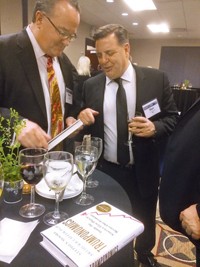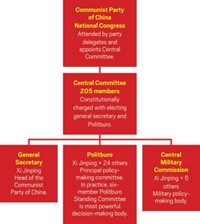Advertisement
Grab your lab coat. Let's get started
Welcome!
Welcome!
Create an account below to get 6 C&EN articles per month, receive newsletters and more - all free.
It seems this is your first time logging in online. Please enter the following information to continue.
As an ACS member you automatically get access to this site. All we need is few more details to create your reading experience.
Not you? Sign in with a different account.
Not you? Sign in with a different account.
ERROR 1
ERROR 1
ERROR 2
ERROR 2
ERROR 2
ERROR 2
ERROR 2
Password and Confirm password must match.
If you have an ACS member number, please enter it here so we can link this account to your membership. (optional)
ERROR 2
ACS values your privacy. By submitting your information, you are gaining access to C&EN and subscribing to our weekly newsletter. We use the information you provide to make your reading experience better, and we will never sell your data to third party members.
People
A visit with Stephen B. King, US ambassador to the Czech Republic
The former chemical industry entrepreneur sees great economic potential in the country
by Rick Mullin
January 13, 2020
| A version of this story appeared in
Volume 98, Issue 2

Always arrive early for an interview, especially if you’ll be waiting in the smoking room of the US ambassador’s residence on Ronalda Reagana Street in Prague. Petschek Villa, an elegant mix of traditional and modernist architecture, is as beautiful as any stop on a tourist trek through one of Europe’s most elegant cities. And like most notable buildings in Prague, it has a history.
Built in the 1920s by mining magnate Otto Petschek, the villa was commandeered first by the Nazis and then by the Soviet army before becoming the headquarters for the Czechoslovak General Staff. In 1945, US ambassador Laurence Steinhardt leased it from the Czechoslovak Ministry of National Defense, establishing an ambassadorial residence.
A visit with Stephen B. King, US ambassador to the Czech Republic
History took another turn when Czechoslovakia emerged from socialism in the Velvet Revolution of 1989, the same year Ambassador Shirley Temple Black moved in. A recent successor, Norman L. Eisen, ambassador under President Barack Obama, captured all the action in a book published in 2018, The Last Palace: Europe’s Turbulent Century in Five Lives and One Legendary House.
At the moment, Petschek Villa is the residence of Ambassador Stephen B. King, former owner of the Wisconsin-based specialty chemical firm Tomah Products.
I arrived early, but the ambassador was right on time. “Wow! How long has it been?” he asked me, entering from the foyer in jeans and a flannel shirt. “At least 20 years,” I answered, assuming, correctly, that I’d caught him on his day off.
King and I last spoke at a conference in the late 1990s. I had found out about his new post only 2 days earlier from a friend at the CPhI pharmaceutical ingredient conference in Frankfurt, Germany. My impetuous email to the embassy the next day asking if I could drop by the day after drew an unexpected response: We will try to fit you in at 4:30 p.m.
Moving to the library for our interview, King started with some background on the architecture of the villa. “There is this thing about the Czechs having golden hands,” he said. “Look at the woodwork in this building. Unbelievable craftsmanship.”
That talent is reflected in the country’s historical strength in manufacturing, he noted. “At the time of the Nazi takeover in 1938, Czechoslovakia was the largest manufacturer of armaments in Europe. Larger than Germany,” he said. “Little doubt as to why Hitler wanted it.”
King, who sold his specialty chemical firm to Air Products and Chemicals in 2006, has been involved in Wisconsin politics for years. He chaired the Republican Party of Wisconsin in 1985, running unsuccessfully for his party’s nomination for the Senate in 1988. His chairing of the Committee on Arrangements at the Republican National Convention in Cleveland in 2016 landed him the offer of an ambassadorship. He was named to the post in October 2017.
King is one of about 40 political appointees, most of them in western European countries, at the 170-some US embassies around the world. He is not Czech and does not speak the language. But he is engagingly knowledgeable about the country’s history and the significance of its chemical industry.
The Czech Republic, established after Slovakia split off in 1992—“No guns, no fighting. From the Velvet Revolution to the Velvet Divorce,” King said—is small, about the size of South Carolina. But it has a lot going for it. Innovation is stirring in the university cities of Pardubice, Olomouc, Ostrava, and Brno, King said. “Brno is the silicon valley of the country. Lots of pharma. Also high-tech and incubator labs.”
King is not the only ex–chemical executive in high places in the Czech Republic. Prime Minister Andrej Babiš is the former managing director of Agrofert Holding, an industrial group that owns Synthesia, a major specialty chemical and explosives company.
“He’s a business guy,” King said of Babiš. “He’s said the country has this great history of being able to make things with its hands, but it has to move to more innovation, more research, and more development. That’s the future. So Babiš and his minister of industry and trade put together an initiative to encourage more research and development in high-tech areas.”
The Czech Republic currently spends 1.8% of its gross domestic product (GDP) on R&D, 40% of which comes from government and European Union funds. Last year Babiš announced plans to increase R&D spending to 3% of GDP by 2030, in line with countries in western Europe.
As ambassador, King has his mind on a bigger picture, including recent demonstrations against Babiš and the Czech Republic’s president, Miloš Zeman. Reaction against Babiš, a populist billionaire, stems in part from fraud allegations in a case that was reopened late last year.
King, who does not know the US president personally, said he is also fielding discontent with the Trump administration, which is generally unpopular in Europe. He has a ready answer for those who question how he can justify representing the impeached president. “I tell them that though I speak for the president, I represent the people of the United States who voted Donald Trump into office,” he says.
When that responsibility winds up will depend on the outcome of the 2020 presidential election. “My assumption is I’d be home for next Christmas if Trump loses. If he wins, I could go into 2021.” King didn’t seem bothered by the prospect of a longer stay. “This is a popular post,” he said.




Join the conversation
Contact the reporter
Submit a Letter to the Editor for publication
Engage with us on Twitter